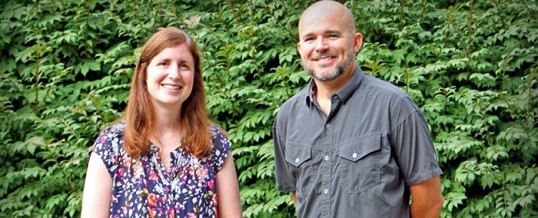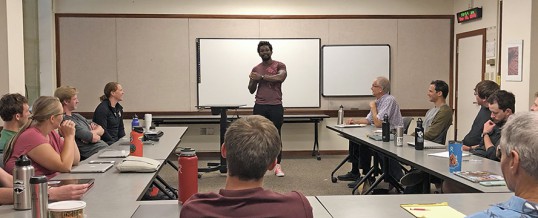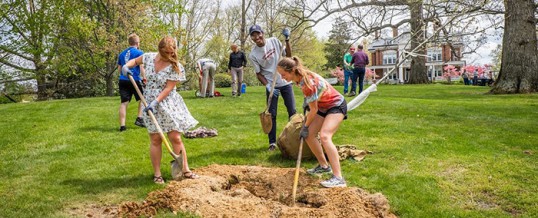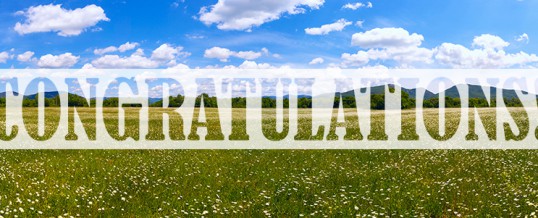[vc_row][vc_column][vc_empty_space][/vc_column][/vc_row][vc_row][vc_column][vc_single_image image=”58431″ img_size=”full” alignment=”center”][vc_column_text]
October 26, 2021
The microbiome has emerged as a fundamental component of all life on earth. For example, microbial communities are key in maintaining the health of plant, wildlife, and human hosts as well as mediating major biogeochemical cycles in most ecosystems. Thus, the ability to study microbiomes is an essential tool across many disciplines of not just biology, but also a variety of other fields relevant to global change.
Recognizing the importance of the subject, a collective of Global Change Center (GCC) faculty affiliates began meeting in 2018 to explore research synergies and opportunities to build upon existing strengths across campus. The group discovered that while the number of labs delving into microbiome-related research was increasing, they were quickly outpacing the availability of relevant student training on campus. As a result, many graduate students interested in microbiome research did not have the background to apply appropriate methods. “Students working with their own ‘big data’ benefit immensely if they know how to leverage computing resources on campus to process and analyze the huge volumes of information from next generation sequencing of microbes” said GCC affiliate David Haak.
In an effort to fill this training gap, members of the GCC Microbiome Working Group combined their research experience to develop a graduate course in the Spring of 2019 titled “Introduction to Microbial Community Analysis”. Collaboratively taught by GCC affiliates David Haak and Brian Badgley from the School of Plant and Environmental Sciences and Lisa Belden and Frank Aylward from the College of Science, the class provided graduate students working in environmental, engineered, and host-associated microbial systems with an understanding of modern tools available for analyzing microbial components of ecosystems and microbial community data.
Students were encouraged to analyze their own data to provide a hands-on educational experience within the context of their own research. Badgley noted, “the most fun aspect of this course is working with students who initially might be intimidated by microbiome research because of their background. As part of that process the students are also learning from the diverse perspectives they each bring from different disciplines and enriching the course beyond what we alone can provide.”[/vc_column_text][/vc_column][/vc_row][vc_row][vc_column width=”1/4″][vc_single_image image=”35937″ img_size=”full” add_caption=”yes” alignment=”center”][/vc_column][vc_column width=”1/4″][vc_single_image image=”35846″ img_size=”full” add_caption=”yes” alignment=”center”][/vc_column][vc_column width=”1/4″][vc_single_image image=”33270″ img_size=”full” add_caption=”yes” alignment=”center”][/vc_column][vc_column width=”1/4″][vc_single_image image=”40199″ img_size=”full” add_caption=”yes” alignment=”center”][/vc_column][/vc_row][vc_row][vc_column][vc_column_text]Demand for this course was evident as enrollment exceeded the initial cap. Students enrolled hailed from five different graduate programs and four different colleges, with IGC Fellows representing approximately 70% of the group. The demand for the course resulted in it being taught again this fall 2021 semester, again with a broad representation of disciplines.
Faculty working groups formed under the GCC have spanned an array of topics to include the microbiome, invasive species, microplastics, environmental justice, ecological restoration, and freshwater salinization. Groups typically coalesce around a problem or thematic topic of shared interest. Most groups start by meeting frequently to develop relationships and an understanding of collective expertise. After identifying shared goals, working groups have moved-on to hold workshops and small conferences, develop manuscripts, submit grant proposals, teach courses, and pursue training grants.
Interested in starting a working group? Contact William Hopkins hopkinsw@vt.edu
[/vc_column_text][/vc_column][/vc_row][vc_row][vc_column][vc_separator style=”shadow”][/vc_column][/vc_row][vc_row][vc_column][/vc_column][/vc_row]








